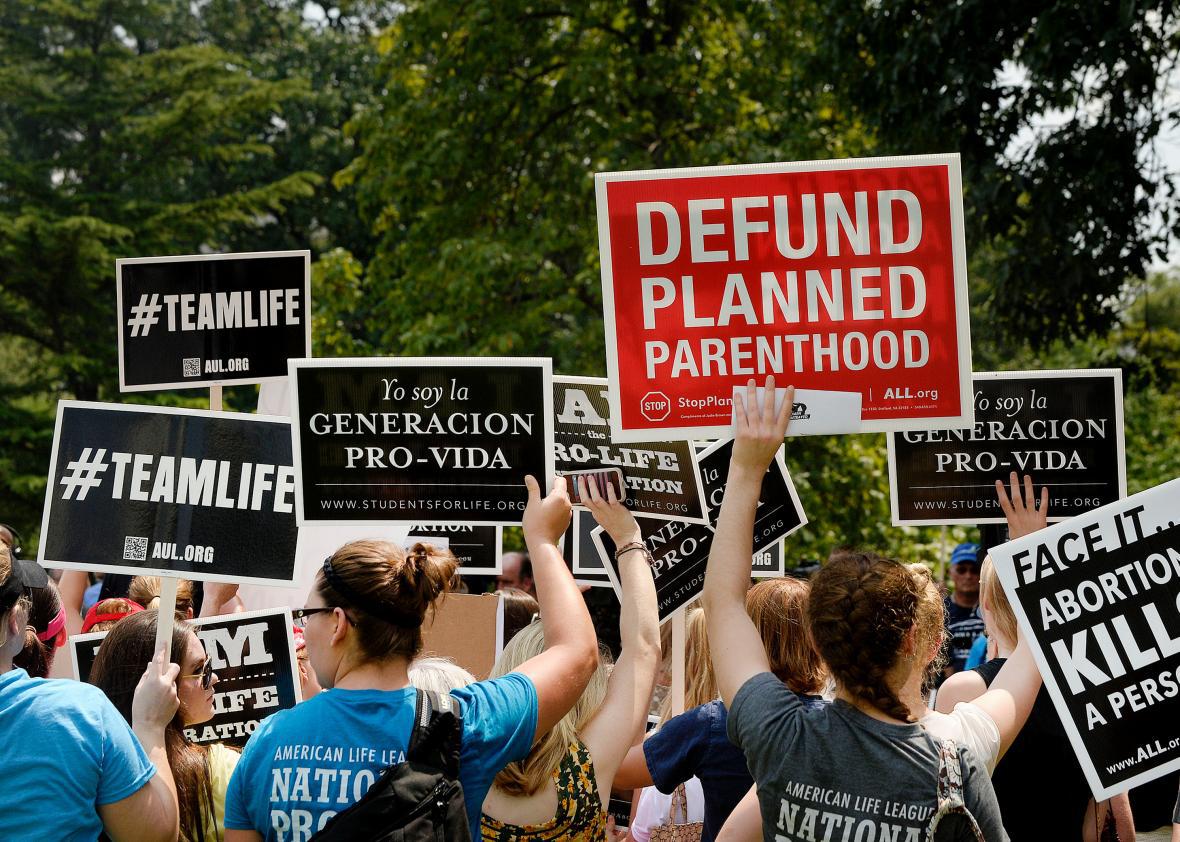Donald Trump’s presidency doesn’t augur well for Planned Parenthood—but his ascendancy has prompted an enthusiastic new wave of activism on its behalf. In the first month after the election, the organization received more than 315,000 donations, more than 82,000 of them given in the name of staunchly anti-abortion Vice President Mike Pence. The day after the inauguration, unabashedly pro-choice women’s marches drew between 3 million and 5 million protesters around the globe. Scarlett Johansson took the stage in Washington to describe relying on Planned Parenthood for her health care when she was 15. “I bet there isn’t one person here who has not been helped by Planned Parenthood, directly or otherwise,” she told the crowd.
That same weekend, a coalition of national anti-abortion groups, #ProtestPP, put out a call rallying supporters for a national protest at more than 130 Planned Parenthood clinics across the country, to occur on Feb. 11. The hope is to pressure GOP leaders to act on their promises to defund the women’s health care provider.
But the Defund Planned Parenthood rally, as it’s called, has become one more spur to action for eager progressives. This coming Saturday, the biggest concern at many Planned Parenthood clinics isn’t that they’ll be flooded with anti-abortion picketers—whose presence they have decades of experience in managing—but rather that they’ll be inundated by sign-waving masses of their own loving supporters.
“While the counterprotesters might have the best intentions, it might not always come across that way to the patient,” Julie Lynn, a spokeswoman for Planned Parenthood of Illinois, told me. “It might be very confusing and almost frightening to walk into a clinic through large groups of people,” regardless of which side’s slogans they’re chanting.
Planned Parenthood affiliates across the country are asking supporters to show their support elsewhere or in other ways. “The obvious one is contacting their representatives and letting their representatives know that Planned Parenthood is important to them,” Lynn says. Planned Parenthood of New York City has gotten around 100 inquiries about counterprotests, according to spokeswoman Carrie Mumah; she has also been commenting on the walls of three Feb. 11 Facebook events to defend the organization, the biggest of which has roughly 10,000 “interested” members. Lynn, meanwhile, says that she’s heard from supporters hoping to turn out at all 16 Planned Parenthood locations in Illinois. Roughly 2,500 people are “interested” on Facebook in a counterprotest in Bloomington, a city of 80,000 in a county that voted for Trump.
Some counterprotesters originally got so fired up they assumed the rally was for them. One #ProtestPP sponsor, the Pro-Life Action League, “got slammed with emails from pro-choice people wanting to come out and support Planned Parenthood,” as spokesperson Eric Scheidler told the Huffington Post. “It took us a while to figure out what was going on,” he said: The people writing to him had misread the call to “defund Planned Parenthood” as an exhortation to “defend” it.
As Planned Parenthood has broadcast the request that clinics be left in relative peace, supporters have altered their plans for Saturday. A group in New York obtained a permit to protest in Washington Square, abandoning their plans to face off with the “defund” crowd at a clinic on Bleecker Street. The Bloomington crew will gather at the McLean County Museum of History. Counterprotesters in Washington briefly considered congregating at the offices of the conservative Heritage Foundation, but since such a demonstration would lack an audience on a Saturday morning, organizers are asking would-be attendees to give money to pro-abortion rights causes and call their elected representatives instead.
All the same, a few supporters may show up at Planned Parenthood sites this weekend. I emailed with Parker Hicks, a 26-year-old HR recruiter who is planning a counterprotest in Dallas. He and his wife are new to activism, but they went to a women’s march in Denton, Texas, and then to the airport protest at Dallas Fort Worth. They tried to contact the clinic, he said, but haven’t been able to reach anyone; they’re also not sure that anyone plans to join them out front on Saturday.
Still, they’re planning on donning their pussy hats; grabbing their signs; and, as Hicks told me, “taking a break from our Valentine’s Day weekend to support [Planned Parenthood] for two hours.” For anti-abortion activists, regular protest has been a habit for years. Now, freshly energized progressives such as the Hickses may be making it a new routine.
